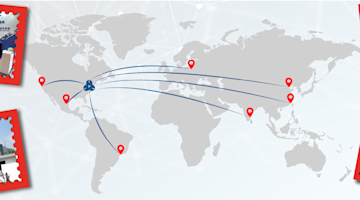Brazil
For more information, contact Achilles Arbex (aarbex@AMTonline.org).
Vehicle production in Brazil, including passenger cars, light utility vehicles, trucks, and buses, rose 10.8% year over year, contributing to a 9.7% annual increase and totaling 2.55 million vehicles, enabling Brazil to reclaim its position as the world’s eighth-largest vehicle producer. This growth reflected expanded credit, higher employment and income, increased fleet renewals, and a recovery in exports, with shipments to Argentina and Uruguay offsetting declines elsewhere. Domestic vehicle registrations surged 14.1% to 2.64 million units, far outpacing the global average of 2%, while total sales of new and used vehicles hit a record 14.4 million units. Imports also rose by 33% to 466,500 units, driven by a significant influx of electrified vehicles, particularly from China.
Truck production saw a strong recovery in 2024. From January to December last year, 141,252 vehicles were manufactured, an increase of 40.5% over 2023. The highlights were the heavy segment, which grew 44%, and the semi-heavy segment, which grew 46%. The truck segment recorded production of 10,679 vehicles in December last year, 18.9% lower than the 13,170 units manufactured in November, and 29.3% higher than the 8,262 vehicles produced in December 2023. In the accumulated total for last year, production reached 141,252 vehicles, an increase of 40.5% over 2023, when it reached 100,535 units, according to the National Association of Automotive Vehicle Manufacturers (ANFAVEA).
Liebherr-Aerospace and Transportation has announced investments worth $50 million over the next 10 years to expand its aerospace manufacturing site at Guaratingueta, Sao Paulo. This milestone decision is based on the company’s trust in the local economic market conditions and related governmental support, as well as on the availability of a highly skilled workforce in the region. Since 2005, Liebherr-Aerospace Brasil has produced critical high-tech components for flight control and actuation systems, environmental control and thermal management systems, landing gear systems, as well as for aircraft engines. The company is certified according to the latest standards, such as Nadcap, and can rely on an advanced industrial setup.
Ocyan and Senai Cimatec signed a cooperation agreement with Petrobras to develop robots for underwater wells, reducing costs and environmental risks. In global mining, collaboration agreements between companies and institutions have become essential to promote innovative and sustainable practices. With the emergence of new technologies and growing concern for the environment, cooperation between sectors is an essential guiding principle for progress. Recently, the joining of forces between Ocyan, Senai Cimatec, and Petrobras exemplified the power of strategic partnerships by combining [DH1] [GU2] efforts toward digital transformation and operational efficiency. This initiative not only aims to optimize processes but also to reduce risks and costs, leveraging the future of mining.
In partnership with Petrobras and Shell Brazil, Senai Cimatec is also opening a plant for on-demand ocean-bottom nodes (OD OBN), the first of its kind in the world. OD OBN is a type of sensor that manages oil reservoirs by measuring seismic waves reflected from subsurface reservoirs, especially for the Brazilian pre-salt layer. This data is then processed by supercomputers, facilitating the optimization of water and gas extraction and reinjection rates to enhance well production. The initiative received $12.27 million of investment from project partners and Petrobras and Shell Brasil through the R&D clause of the National Agency of Petroleum, Natural Gas and Biofuels (ANP).
Mexico
For more information, contact Carlos Mortera (cmortera@AMTonline.org).
Korean company Doosung Tech will open a plant in Monclova in January 2025 with an initial investment of $25 million. The plant will produce components for electric car batteries.
In Chihuahua, the first stone for a new Emerson plant has been laid. This project will represent an investment of $22 million and is part of the expansion strategy of the leading company in flow measurement technologies. The plant will be located in the Bafar Norte industrial complex.
Chinese company Mesnac, a global leader in rubber processing machinery, has announced an initial investment of $20 million to establish a new production plant in Leon, Guanajuato, where it will produce rubber manufacturing systems.
Amazon Web Services will invest $5 billion in Queretaro, Mexico, to develop a data center that will expand infrastructure and deliver innovation in machine learning, artificial intelligence, and other technologies.
Bayer has announced an investment of $55 million in the State of Mexico to expand its pharmaceutical production and create a Global Innovation Center.
Nidec, a Japanese Tier 1 manufacturer of industrial generators and alternators for North America, has invested $23 million in the expansion of its plant in Reynosa, Tamaulipas.
Bajio and Mexico’s northern regions seek to boost chip manufacturing in the country. Some major companies located in the region include Foxconn and Qualcomm in Baja California, Amphenol in Sonora, Foxconn in Chihuahua, Celestica in Coahuila, Lenovo in Nuevo Leon, and LG in Tamaulipas.
Hi-Lex Controls has inaugurated a new plant in Coahuila. This manufacturer of window regulators, door modules, and mechanical control cables for the automotive industry has opened a new facility in Derramadero, Coahuila, requiring an investment of $15 million.
Copeland has opened a facility in Coahuila. As a leader in sustainable heating and cooling solutions, the company has launched a new compressor plant in Arteaga, with an investment of $22 million.
Balji JMC Paper has opened a new facility in Juarez, Mexico, with a total investment of $40 million for a paper processing facility.
Fermaca Networks plans to invest $3.5 billion in a new data center in Durango, which is expected to be operational by the end of 2025.
Dimer will open a new facility in Celaya, Mexico, with an investment of $15 million. The plant will produce resin-based products for industries such as automotive, medical, white goods, furniture, and telecommunications.
Sinoboom has announced a new investment of $150 million in Bajio. The plant will manufacture lifting platforms and is set to begin operations in mid-2025.
Envases Universales (Universal Packaging) will expand its Monterrey facility with an investment of $50 million. This new expansion will enhance production of their packaging systems.
Doowon Refrigeration has invested $18 million in a new facility in Apodaca. It will be focused on manufacturing automotive components for air moving and HVAC systems, as well as hoses and piping systems.
Guntner will open its fifth plant in Nuevo Leon. With an investment of $15 million, the German-based company will expand its production of cooling systems.
Bombardier Recreational Products has opened a new production line for electrical components and batteries, specifically oriented toward the new Can-Am model.





